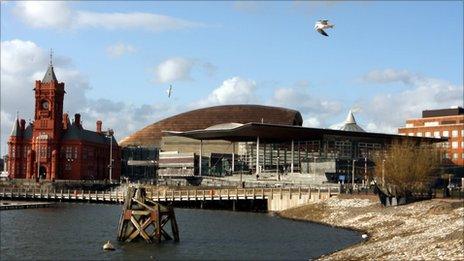What will Wales powers referendum result mean?
- Published

Voters go to the polls in the referendum this Thursday
By early afternoon on Friday, we should know the outcome of the Welsh referendum. But what will the result actually mean - for Wales and the rest of the UK?
Just as people often vote in referendums for reasons that go well beyond what is ostensibly at stake, so the consequences of a referendum can range far beyond the question on the ballot paper.
If, as the polls have consistently suggested is likely, Wales votes Yes, the direct result will be a substantial increase in the Welsh assembly's legislative powers.
At present, the assembly has powers over 20 broad policy areas, including health, education, the environment and transport, but it must ask parliament for primary law-making powers on a case-by-case basis.
If Wales votes Yes, the assembly could then pass laws without first having to gain the consent of Westminster.
What is done with those powers, though, will depend greatly on the outcome of May's election, and any coalition negotiations that may follow.
Understandably, the parties will have rather different agendas and priorities.
But the implications of a Yes vote do not stop there. A substantial Yes vote would give a more general boost to the standing of the Welsh assembly.
The outcome of the 1997 referendum, where devolution scraped through by a narrow majority on a low turnout, continues to be used by some to challenge the legitimacy of the institution.
Many both inside and outside Wales took 1997 to show that the Welsh are pretty ambivalent about devolution. Survey evidence suggests that public attitudes have moved a long way since 1997 - but real votes would be much harder evidence yet.
Second, taken together, a more powerful Welsh assembly and the Westminster government's planned reduction in Welsh MPs from 40 to 30 would likely produce a distinct shift in Wales's political centre of gravity. What goes on in London would still matter for Wales. But rather more of Welsh political life would tend to focus on Cardiff Bay.
Third, some consequences of a Yes might extend well beyond Wales. A more powerful Welsh assembly would reduce, though not eliminate, the asymmetries in devolution across the minority nations of the UK. This might lead to a renewed focus on devolution's major remaining anomaly - the position of England.
And the boost to the standing of the assembly and its ministers from a Yes might have consequences for Wales' weight in on-going discussions about revisions to the Barnett formula that governs the block-grants given to the devolved bodies.
But polls have been wrong in the past. What if Wales votes No?
Ostensibly there are no implications: the assembly would continue to exist, operating under the same powers and structures as now. But in reality, things could surely not remain untouched. A No vote - which would go against the leadership of all the parties in Cardiff Bay - would deal a huge blow to the status of the assembly.
The emerging consensus among Wales' political elite in recent years has regarded devolution as a developing process, with steadily growing - though not fervent - public support.
A No vote would shatter this consensus, and indicate that it had been based on fundamentally flawed assumptions. The very existence of the assembly would be questioned, and there would likely be calls for a referendum on its abolition.
Certainly, any further requests made to Westminster by the assembly for law-making powers under the current Legislative Competence Order (LCO) system would be viewed with great scepticism.
Many people have criticised the Welsh referendum as being unduly technical - for concerning a matter of detail rather than one of fundamental principle. This may well be true.
But the consequences of such a referendum can go much further than what is actually on the ballot paper. The outcome of the 2011 referendum vote is likely to do much to shape Welsh politics, and Wales' position within the UK, for many years to come.